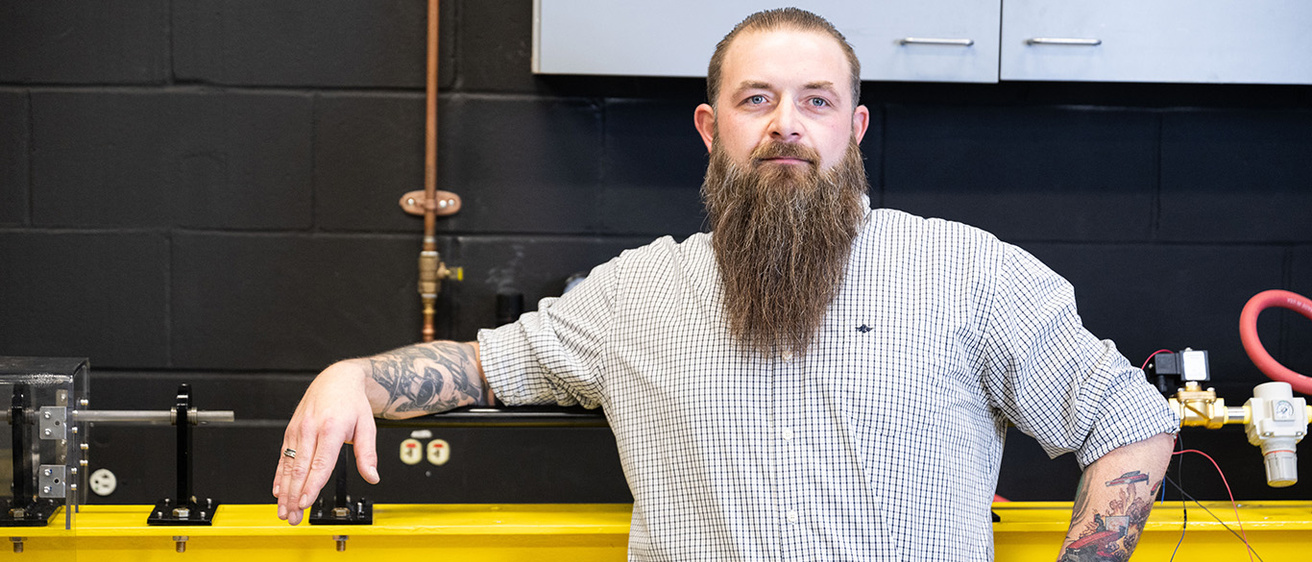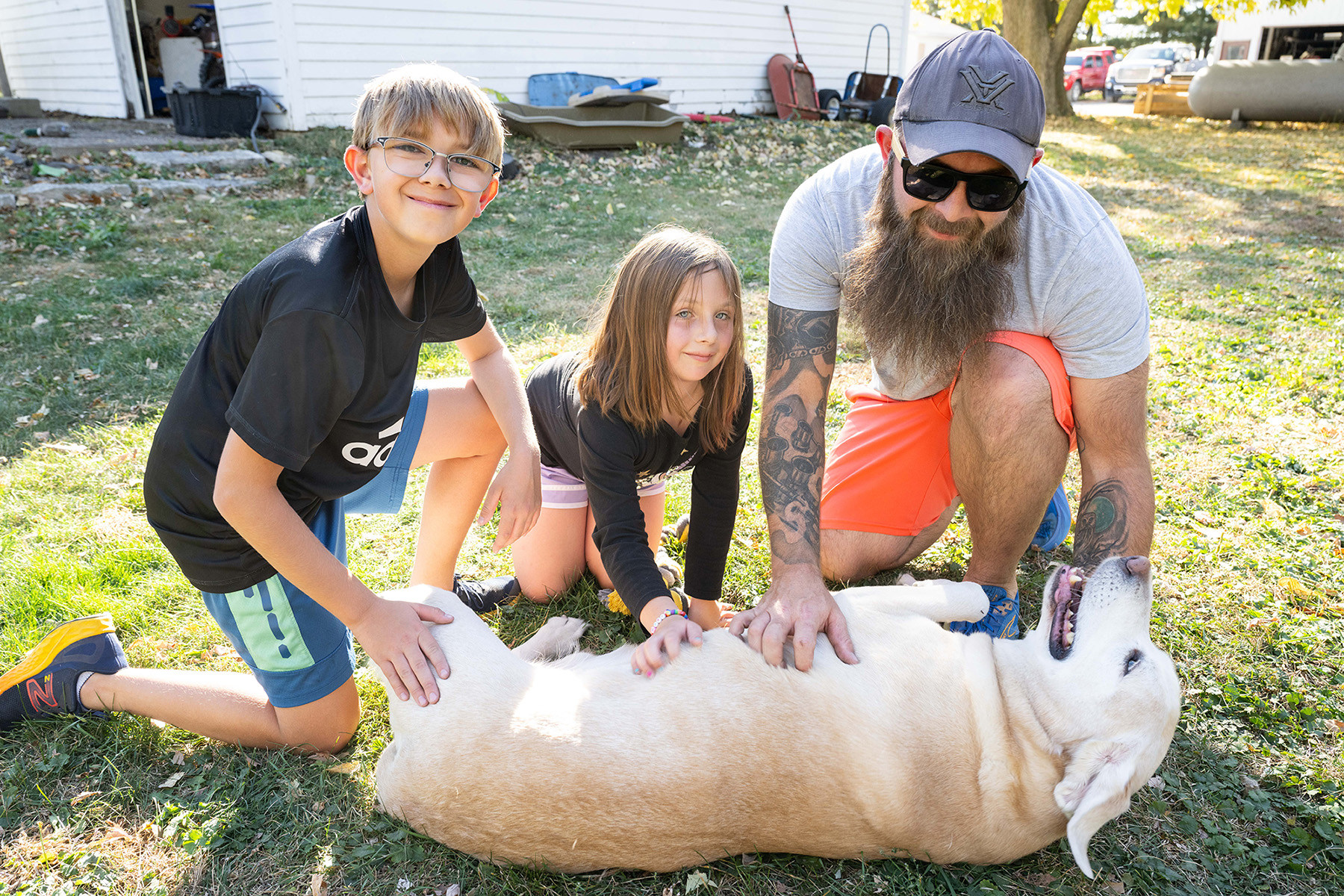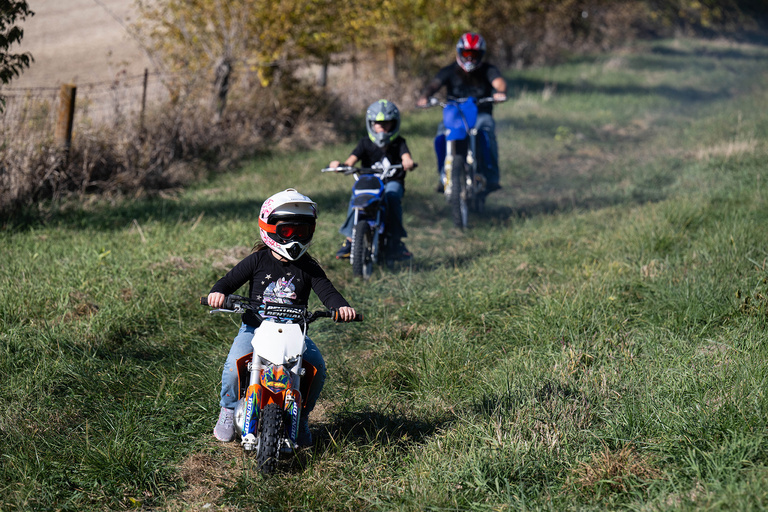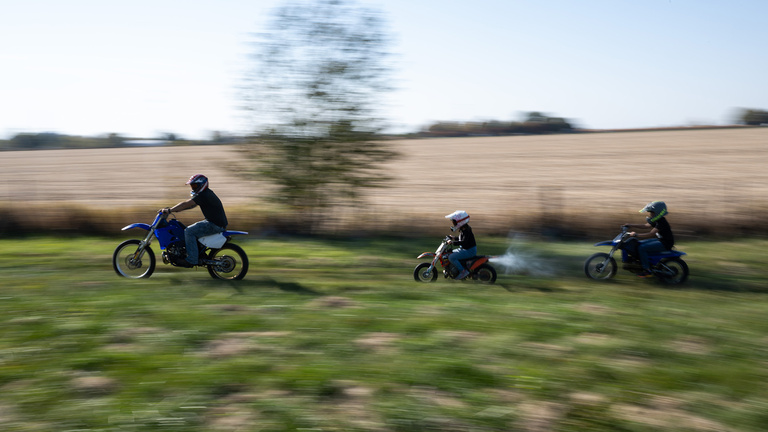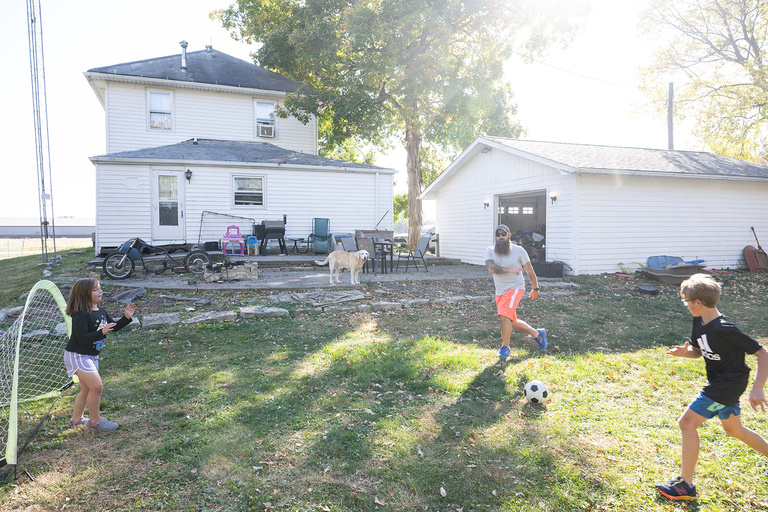Serving in the U.S. Marines gave Arnold “Bill” Bangel III the focus he needed to pursue a PhD in industrial and systems engineering. Learning how to navigate a devastating loss gave him life perspective.
Story: Sara Epstein Moninger
Photography: Justin Torner and Tim Schoon
Published: Feb. 4, 2025
By day, Arnold “Bill” Bangel III guides undergraduate students through lab assignments at the University of Iowa College of Engineering. In his own campus lab, he is busy completing his doctoral studies in industrial and systems engineering and conducting research for the U.S. Department of Energy.
By evening, Bangel is 48 miles south of the Iowa City campus — and in a different world. On an acreage he rents in Mount Pleasant, Iowa, he is simply “Dad,” caring for his two school-aged kids, often shuttling them to various sports practices and competitions. Other times, he is engaging them in recreational activities such as zooming around on dirt bikes with the family’s yellow Labrador retriever trotting faithfully behind. He calls this his “throttle therapy,” which allows him to decompress and have fun.
Bangel is a nontraditional student by many measures. After high school, the Indiana native dropped out of college and joined the U.S. Marines, serving nine years at Camp Lejeune in North Carolina while also getting married and starting a family. Using the GI Bill to fund his tuition, he eventually went back to school and earned bachelor’s and master’s degrees in engineering technology at Western Illinois University. A year after beginning a doctoral program at Iowa, his wife, Tiffany, passed away suddenly, and he was thrust into single parenthood.
Navigating this unexpected loss was harder than Bangel thought it would be. He considered leaving the Iowa program. But the desire to provide a stable life for his children, coupled with support from his engineering colleagues, who stepped in to lead his classes, helped him stay the course. He will earn a PhD from Iowa in May 2025.
“After my wife’s death, I took a step back and thought about everything. I realized that as long as I was able to finish my PhD, the jobs would bring more financial stability and more time off to be with my kids,” he says. “I just want to make sure I can be there to take care of my kids and support them.”
Finding a niche in engineering
Through his stint in the military and a string of “side hustles” — farm work, pizza delivery, landscaping, auto mechanics, and running salon and vinyl businesses with his wife — Bangel learned that engineering was the best place for him. It just took time for him to realize it.
“I didn’t really fit in with a lot of the engineers when I was first in college, and I think that’s because I didn’t have the same maturity or the right mindset. I lacked discipline and focus,” he says. “But I was a different human being when I got out of the military, and I thought that if I was going to do anything, I should continue with engineering. From all my previous jobs, I knew what I didn’t want to do. That said, I had no clue it was going to take me on this path. Once I got back into engineering, however, it was very easy, and then things just snowballed.”
When Bangel began searching for a PhD program, Iowa rose to the top of the list. Not only did he have a friend from his undergraduate college enrolled in the UI College of Engineering, but he also found the right fit in a job as a graduate research assistant in the Additive Manufacturing-Integrated Product Realization Laboratory. The lab investigates how to make additive manufacturing processes more sustainable and energy efficient.
“I was working with composites and fibers at my last university, and a lot of what I do now is composites and thermal plastics,” he says. “For the Department of Energy study, I am using recycled paper — midterms and finals and homework — to make feedstock for 3D printing.”
Did you know?
Industrial engineers work to enhance systems and processes. They explore business challenges and find innovative solutions to boost efficiency, safety, and effectiveness. In short: Industrial engineers figure out how to do things better.
By emphasizing group projects, real-world applications, and a flexible, customizable curriculum, the University of Iowa College of Engineering offers undergraduate and graduate training in industrial and systems engineering that goes beyond the types of problems where the correct answer is in the back of the book. Working with faculty, students might develop robots for space exploration, a production system for a Fortune 500 company, data-mining tools for a hospital, or a new jet cockpit.
“There’ll be a lot of places you don’t fit, but keep doing your thing, because eventually doors are going to open — doors you didn’t think would open.”
Using recycled paper in this way has huge implications, Bangel explains. It reduces the amount of nylon powder needed as a binding agent to create 3D prints, making the process cheaper. And it’s better for the environment.
“About 6 million tons of wastepaper go to the landfill every year. If we can utilize this process more commercially, it would drop the price of 3D prints while also saving space in landfills,” he says. “The powder is the most expensive part of the process, so we’re saving about 40% nylon by implementing into the process paper with similar mechanical properties.”
For one project, Bangel created a finger pickup for a tractor that would help pop off cotton bales. Although not as strong as carbon fiber, the nylon powder–paper combo can be used in myriad ways, he says.
“It’s just recycled paper and nylon, but with this process you could manufacture whatever you want, depending on application,” he says. “Also, most recycling processes are extremely expensive because they have to remove the inks, the dyes, the clays — everything that they put on magazines to make them beautiful — but I leave it in. The only thing I pull out is staples.”
It’s work that Bangel loves.
“I’ve gone from creating products from recycled paper to helping a student manufacture carbon-fiber muscles for prosthetics. Now I’m doing composite additive manufacturing using different types of bio-fibers for a National Science Foundation biomanufacturing project. It’s not the same day on repeat,” he says. “Not everyone can find what they really enjoy in life, but I really enjoy doing engineering stuff.”
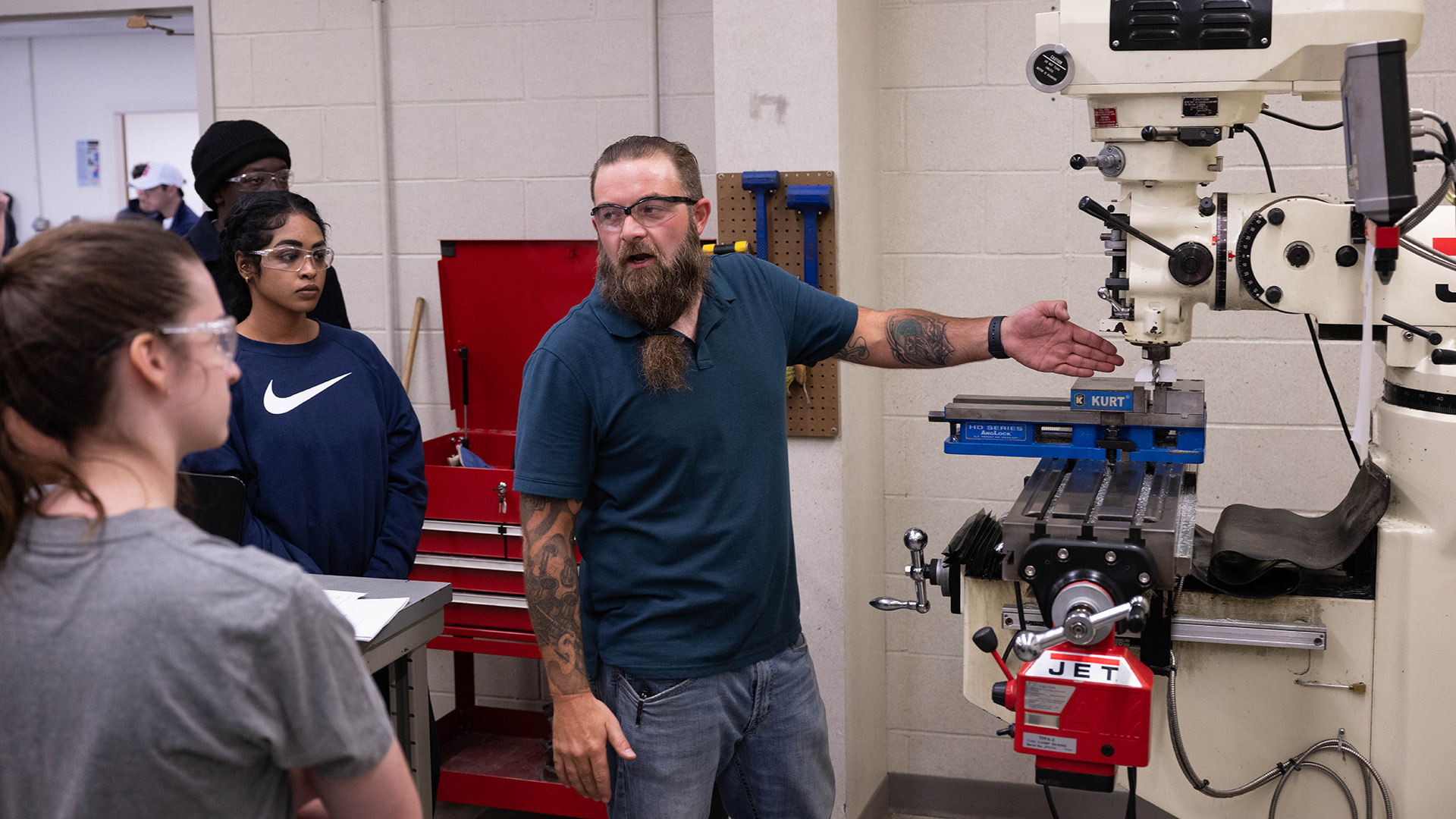
Arnold “Bill” Bangel III guides undergraduate students through lab assignments at the University of Iowa College of Engineering. Bangel was named an Outstanding Teaching Assistant in 2024.
“Working with Bill is an amazing combination of being able to learn and being hands-on with the projects. He knows what’s important for us to learn and is very approachable whenever we need help.”
Planning for the next phase
Xuan Song, associate professor of industrial and systems engineering, is Bangel’s advisor. He says Bangel’s experience and expertise will set him apart in the job market.
“Bill is highly skillful and knowledgeable in manufacturing and is always able to connect his practical experience to research and teaching,” he says. “All of our faculty and students are dedicated to solving various real-world problems in manufacturing, transportation systems, and health care by leveraging interdisciplinary expertise in engineering, computing, economics, and human physiology.”
Bangel, who was named an Outstanding Teaching Assistant in 2024, has enjoyed teaching more than he expected and considered a job in academia, but for now he plans to search for a position in a government research lab.
Diego Robles, a junior industrial and systems engineering major from Puerto Rico, works with Bangel in the classroom and in the lab. He says Bangel is particularly skilled at explaining concepts and has also been a wonderful mentor.
“Working with Bill is an amazing combination of being able to learn and being hands-on with the projects,” Robles says. “He knows what’s important for us to learn and is very approachable whenever we need help. Plus, he is always available for anything — whether I have a question about class or need career-related advice.”
Drawing from his lived experience, Bangel encourages students to stick with their passions. Moving forward and following an early interest in robotics led him to engineering.
“There’ll be a lot of places you don’t fit, but keep doing your thing, because eventually doors are going to open — doors you didn’t think would open,” he says. “I’m probably one of the only Marines that served in the infantry now doing research. It’s been a life.”
As he approaches graduation, Bangel says he welcomes the next chapter.
“I am a 37-year-old PhD student, and I am ready to be an ‘adult’ again — to start over in a new place and raise my kids to be the best that they can be,” he says. “I overheard them talking on the phone to some friends the other day. They are proud of me for doing all that I have done. They have seen me lose and keep going, regardless of the situation.”
